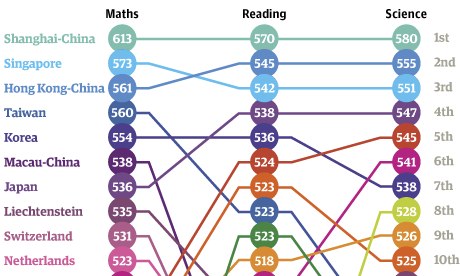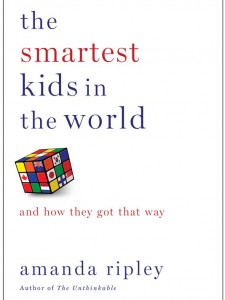
Chart courtesy of theGuardian.com
After American 15-year-olds scored 36th overall on the global Reading, Math, and Science test, will parents continue to send their students to study in America? Test-obsessed parts of the globe may look at the 2012 results of the Program for International Student Assessment (PISA) and determine that our K-12 education does not compare to theirs. Or parents might not care and just send their kids to America anyway. (We’ve still got the highest ranked universities in the world…)
I’ve commented before on the results of the PISA test in 2009 and while it may seem that American kids are not great test-takers, there are A LOT more comparisons that need to be drawn in order to determine whether a student is “successful” or not. Participation in group activities, presentation making, and creative thinking are very difficult to grade objectively; but unfortunately, the easiest way to compare A LOT of students is to quantify their answers in test format. From these results our leaders and decision makers have to make judgment calls about what to do next. Our results were poor, but how do we improve?
Before we start the heated debate over who is to blame and what needs to change, we should definitely take a closer look at both obvious and less obvious winners. Certainly Shanghai, Singapore, and Hong Kong have their own advantages which we can learn from, arguably- like their longer school days, test-focused instruction, and reduced physical education. These are obvious tactics which we probably could begrudgingly employ but they may not be the only solutions.
 In Amanda Ripley’s book, The Smartest Kids in the World and how they got that way, she makes some interesting highlights about the types of countries that have succeeded at PISA. It’s not only about having “the smartest kids” but also a certain kind of teaching excellence. For instance, Finland is a great example of teaching excellence because of their reposturing of the teaching profession in their society. In the 1960s they shut down teacher training schools and reopened them as part of the top (ivy league) schools in that country. By doing so, teaching quality became stronger, and perhaps more importantly, students noticed… A ripple effect ensued through out the system which has resulted in Finland leading much of the rest of Europe in test scores.
In Amanda Ripley’s book, The Smartest Kids in the World and how they got that way, she makes some interesting highlights about the types of countries that have succeeded at PISA. It’s not only about having “the smartest kids” but also a certain kind of teaching excellence. For instance, Finland is a great example of teaching excellence because of their reposturing of the teaching profession in their society. In the 1960s they shut down teacher training schools and reopened them as part of the top (ivy league) schools in that country. By doing so, teaching quality became stronger, and perhaps more importantly, students noticed… A ripple effect ensued through out the system which has resulted in Finland leading much of the rest of Europe in test scores.
In America, she says, we educate 2x the amount of teachers our education system needs. But when you set standards (not just a list of certifications needed for entry into the profession) but actually put teachers on the same pedestal as doctors or lawyers, the obvious value added to the education system can be seen (in scores), not just heard (from politicians).
“Getting into education colleges in Finland is like getting into MIT in the United States.” She mentioned on Fareed Zakaria’s program last week. “Teachers could then be paid more, given even more freedom, and given the respect they deserve.” I would love to see this happen, too.
Our kids are amazing and they are smart! In their minds, the pressure is on to perform on a stage that some teachers might not be preparing them for. And although the solution sounds like “teaching to the test” or getting prescribed standards that anyone could teach, our teachers really should feel the same pressure these kids feel. We should reverse the idea of “those who can do, those who can’t teach” to “the best who CAN teach.” Only then will we achieve better results in our own way and through our own approaches.

-
http://dangerouslyeasyesl.com deesl
-
benpiscopo
 Custom Search
Custom Search